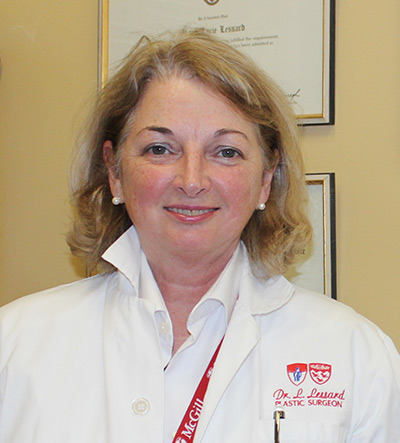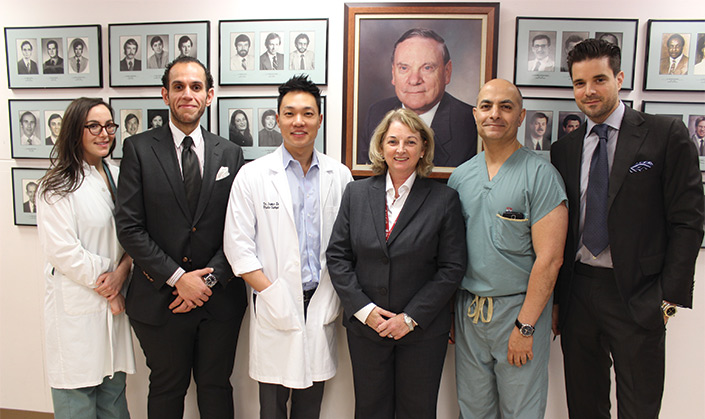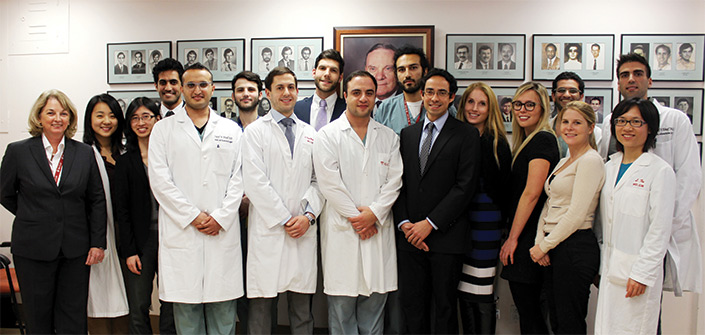MUHC plastic surgery team: pushing boundaries in the name of our patients
Every day, plastic surgeons at the McGill University Health Centre (MUHC) take on complex reconstructive cases, literally changing patients’ lives so they can face the world with confidence.

Dr. Lucie Lessard, chief of MUHC Plastic Surgery Division
“All MUHC plastic surgeons focus on diverse ‘super specialties’ within the specialty, like craniomaxillofacial surgery, breast cancer reconstruction, or hand surgery,” explains Dr. Lucie Lessard, chief of the MUHC Plastic Surgery Division. “Every staff member is also trained in pediatrics and is capable of taking care of any case arriving from the Emergency or Trauma departments.”
Depending on the case, plastic surgeon services are required by many other specialists, from oncologists to neurosurgeons, orthopedists, ophthalmologists, cardiac surgeons, ENT’s and obstetrician gynecologists, to name a few. In the clinic and in the OR, well trained nurses and other professionals who work with different specialties also participate in this team work at the MUHC.
Most adult patients who need plastic surgery have experienced trauma or cancer. The team sees at least 100 trauma patients every week, and this number sometimes climbs to 150. Hand surgery represents a big part of the cases seen in the tertiary trauma centre at the Montreal General Hospital (MGH-MUHC). “If the hand fracture is severe or if the finger was completely cut off, we have to perform microsurgery. This means we have to reconnect the vessels, which can be less than a millimetre, with sutures smaller than a hair in diametre. These longer and more difficult surgeries are required when a nerve or an artery is cut. They are performed with sophisticated microscopes,” explains Dr. Lessard.
The team also helps numerous women who need breast reconstruction following cancer. “The work to reconstruct a breast demands very complex three dimensional skills,” says Dr. Lessard.
On the pediatric front, lives are also transformed. “We can make an amazing difference in the life of a child who is born with significant facial differences, like cleft lips for example,” says Dr. Mirko Gilardino, director of the Montreal Children’s Hospital of the MUHC Plastic Surgery Program.
“Some children are born without ears and ear canals. In these cases we can construct an ear using a child’s rib. For a patient who is unable to smile we can reconstruct their face using a part of their leg to enable them to smile,” says Dr. Lessard.
“The reason I like plastic surgery is that you get to operate on every part of the body. The greatest challenge for me is to reconstruct a part of the body that has been removed due to cancer, or other reason, and to make it look normal again,” says MUHC Plastic Surgeon Dr. Teanoosh Zadeh.
“I like that we have such a big variety of cases, from facial trauma to reconstruction to wounds healing, and the greatest challenge is that every single patient and reconstruction is different. Nothing is ever exactly the same; there’s no unique procedure and everything requires excellent problem solving skills,” says Plastic Surgeon Dr. James Lee.
Education and research play an important role within the division, which welcomes several residents from around the world each year. Competition is fierce and only the best are chosen. All residents touch all areas of expertise. In addition, several of them participate in research projects (Master’s degree in Experimental Surgery) under the supervision of Dr. Anie Philip, head of the research laboratory in Plastic Surgery at the MGH-MUHC, as well as of Dr. Lessard and Dr. Gilardino. Research at the MGH-MUHC focuses on wound healing/molecular biology, a field that has evolved a lot over the past 10 years.
Dr. Lessard is very proud of the talented and dedicated Plastic Surgery team. “It’s a great specialty, I have to say. And a very rewarding one,” she says.
“By recovering the function or aesthetics of a part of their body, our patients are able to return to society, and this really matters. Seeing a happy patient is what keeps us going.”
 The MUHC Plastic Surgery team. From left to right: Dr. Sabrina Cugno, Dr. Omar Fouda Neel, Dr. James Lee, Dr. Lucie Lessard, Dr. Teanoosh Zadeh and Dr. Mirko Gilardino.Not present: Dr. H. Bruce Williams, Dr. Mario Luc, Dr. René Crépeau, Dr. Gaston Schwarz, and Dr. Broula Jamal. In the background: McGill plastic surgeon graduates from the last decades, in practice all over the world.
The MUHC Plastic Surgery team. From left to right: Dr. Sabrina Cugno, Dr. Omar Fouda Neel, Dr. James Lee, Dr. Lucie Lessard, Dr. Teanoosh Zadeh and Dr. Mirko Gilardino.Not present: Dr. H. Bruce Williams, Dr. Mario Luc, Dr. René Crépeau, Dr. Gaston Schwarz, and Dr. Broula Jamal. In the background: McGill plastic surgeon graduates from the last decades, in practice all over the world.

Dr. Lucie Lessard and MUHC Plastic Surgery residents. From left to right: Dr. Lucie Lessard, Dr. Fanyi Meng - R1, Dr. Julie Chakriya Kvann - R5, Dr. Hassan Alnaeem - R3, Dr. Nayif Alnaif - R2, Dr. Becher Alhalabi - R1, Dr. Alex Viezel-Mathieu - R2, Dr. Jonathan Kanevsky - R3, Dr. Parseh Bakirtzian - R5, Dr. Hani Shash - R4, Dr. Rafael Galli, - Craniofacial Fellow from Brazil, Dr. Marie-Christine Aumas - R5, Dr. Anne-Sophie Lessard - R4, Dr. Abdulrahman Alamri - R4, Dr. Camille Aubin-Lemay - R3, Dr. Liqin Xu - R3, and Dr. Alain Azzi - R1.
